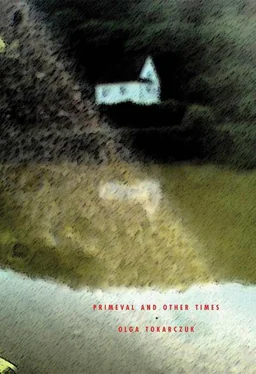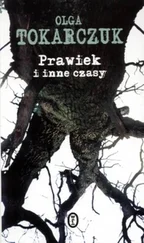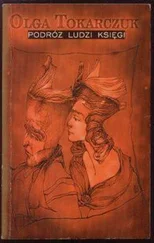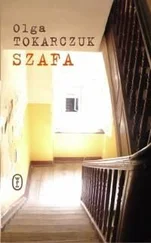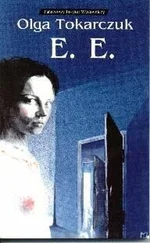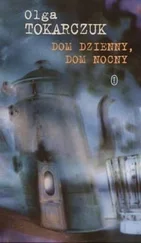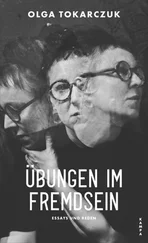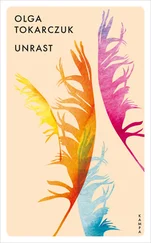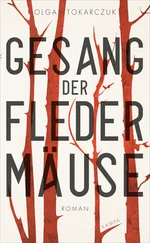“I’ll help you,” she said, and Misia handed her a knife. Ruta’s large hands sliced the cake, her red fingernails flashing against the whiteness of the cream like drops of blood.
The men started singing, and Misia glanced anxiously at Ruta.
“I must put the children to bed. Take them the cake,” she asked her.
“I’ll wait for you. I’ll do the dishes.”
“Ruta!” the drunken Ukleja suddenly screamed from the living room. “Come here, you floozy!”
“Come on,” said Misia quickly, and took the tray with the cake.
Ruta put down the knife and reluctantly followed Misia. They sat down by their husbands.
“Look what a nice bodice I bought my wife!” cried Ukleja, and tugged at her blouse, revealing a freckly cleavage and a snow-white lacy brassiere. “French!”
“Stop it,” said Ruta quietly.
“What do you mean, stop it? Aren’t I allowed? You’re mine, all of you and everything you’ve got on.” Ukleja looked at the amused Paweł and repeated:
“She’s all mine! And so’s everything she’s got on! I’ve got her all winter. In summer she fucks off to her mother.”
Paweł pointed at his guest’s full shot glass. They took no notice when the women went back into the kitchen. Ruta sat down at the table and lit a cigarette. Then Izydor, who was lying in wait for her, took the opportunity to bring out his box of stamps and postcards.
“Look,” he said encouragingly.
Ruta picked up the postcards and looked at each one for a while. She blew streams of white smoke from her mouth, and her lipstick left mysterious marks on the cigarette.
“I can give them to you,” said Izydor.
“No. I prefer to look at them at your place, Izek.”
“You’ll have more time in the summer, won’t you?”
Izydor saw that a big tear had settled on Ruta’s stiff, mascara-coated eyelashes. Misia handed her a glass of vodka.
“I’m so unlucky, Misia,” said Ruta, and the tear trapped in her lashes rolled down her cheek.
Adelka didn’t like her father’s friends, all those men whose clothes stank of cigarettes and dust. The most important of them was Ukleja – surely because he was so big and fat. But even Ukleja was nice and polite and spoke in a less booming voice when Mr Widyna came to see her father.
Widyna was brought by a chauffeur, who then waited all evening outside in his car. Widyna had a green hunter’s uniform and a feather in his hat. He clapped Paweł on the shoulder in greeting and gave Misia’s hand a long, disgusting kiss. Misia told Adelka to look after little Witek while she fetched the best provisions from the larder. The knife flashed in her hand as she sliced dry sausage and ham. Paweł talked of Widyna with pride, saying: “In this day and age it’s good to have such acquaintances.”
These particular acquaintances of her father’s were keen on hunting, and would arrive from the forest laden with hares or pheasants. They would put it all on the table in the hall, and before sitting down to dinner they would knock back half a tumbler of vodka. The house smelled of bigos stew.
Adelka knew that on this sort of evening she would have to play. She also made sure Antek was on hand with his accordion. There was nothing she feared as much as her father when he got angry.
When the time came, her mother told them to fetch their instruments and go into the living room. The men would be smoking cigarettes, and silence would fall. Adelka struck the key note, and then she and Antek began to play together. For In the Trenches of Manchuria Paweł fetched his violin and joined their duet. Misia stood in the doorway and watched them proudly.
“I’m buying a double bass for the youngest one,” said Paweł.
Witek hid behind his mother whenever people looked at him.
The whole time she played, Adelka kept thinking about the dead animals on the hall table.
They all had their eyes open. The birds’ eyes looked like glass stones from rings, but the hares’ eyes were terrible somehow. They seemed to follow her every move. The birds lay tied by the legs in bunches, like radishes. The hares lay singly. She looked for bullet wounds in their fur and feathers, but she only occasionally managed to find congealed round scabs. The dead hares’ blood dripped from their noses onto the floor. They had sweet little muzzles similar to a cat’s. Adelka would adjust their heads to make sure they were on the table.
One day, among the shot pheasants she noticed another kind of bird. It was smaller and had beautiful blue feathers. Their colour thrilled her, and she longed to have them. She didn’t yet know what she would do with them, but she knew she wanted them. She carefully pulled out the feathers, one after another, until she was holding a feathery bouquet. She tied it with a white hair ribbon and went to show her mother. In the kitchen she ran straight into her father.
“What’s this? What have you done? Do you know what you’ve done?”
Adelka shrank back against the dresser.
“You’ve plucked Mr Widyna’s jay! And he shot it specially.”
Misia stood next to Paweł, and the guests’ curious heads appeared in the doorway.
Her father grabbed Adelka by the arm with an iron grip and steered her into the living room. He pushed her angrily, so that she stopped in front of Widyna, who was talking to someone.
“What is it?” he asked vacantly. His eyes were cloudy.
“She’s plucked your jay!” cried Paweł.
Adelka held out the bouquet of feathers. Her hands were shaking.
“Give those feathers back to Mr Widyna,” Paweł snapped at her. “Misia, fetch me some peas. We’ll punish her as an example. You have to be tough with children… And keep them on a tight rein.”
Misia reluctantly handed him a bag of peas. Paweł scattered the peas in a corner of the room and told his daughter to kneel down on them. Adelka knelt down, and there was a short silence. She could feel everyone looking at her. She thought she was going to die now.
“To hell with the jay. Pour us a drink, Paweł,” gurgled Widyna in this silence, and the hubbub started up again.
Paweł lay on his back and knew he’d never fall asleep now. Outside it was getting grey. His head ached and he was terribly thirsty. But he was too tired and downcast to get up and go to the kitchen. So he brooded on the whole of the previous evening, the big drinking spree, the first few toasts, because he couldn’t remember the rest, Ukleja’s vulgar jokes, the displeased expressions on some of the women’s faces and some of their grievances. And then he considered the fact that he had turned forty, and that the first part of his life was over. He had reached the peak, and now, lying on his back with a monstrous hangover, he was watching time go by. He started recalling other days and other evenings, too, watching them like a film when it is run from end to beginning – ludicrous, funny, and nonsensical, like his life. He could see all the images in detail, but they seemed trivial and meaningless. Like this he saw his entire past, and found nothing in it to be proud of, nothing to gladden him, or stir any kind of positive emotions. In this entire, bizarre tale there was nothing certain or permanent, nothing to get a grip on. There was just an endless struggle, some unfulfilled dreams and unsatisfied desires. “I’ve had no success at all,” he thought. He felt like crying, so he tried, but he must have forgotten how, because he hadn’t cried since childhood. He swallowed thick, bitter saliva and tried to emit a childish sob from his throat and lungs. But nothing came of it, so he cast his mind into the future and forced himself to think about what was going to happen, what he still had to do: a training course and certainly a promotion, the children going to middle school, building an extension for the house and some rooms to let – not just rooms but a boarding house, a holiday cottage for summer vacationers from Kielce and Kraków. For a while he cheered up inside and forgot about his headache, his bone-dry tongue and his suppressed tears. But the dreadful grief came back. He felt as if his future would be the same as his past – various things would happen in it that meant nothing and led nowhere. This idea made him feel fear, because after all that, after the course and the promotion, after the boarding house and the extension, after all sorts of ideas or any kind of activity came death. And Paweł Boski realised that on this sleepless, hung-over night he was staring helplessly at the birth of his own death – that in his life the hour of noon had already struck, and now, gradually, deviously, and imperceptibly the twilight was closing in.
Читать дальше
